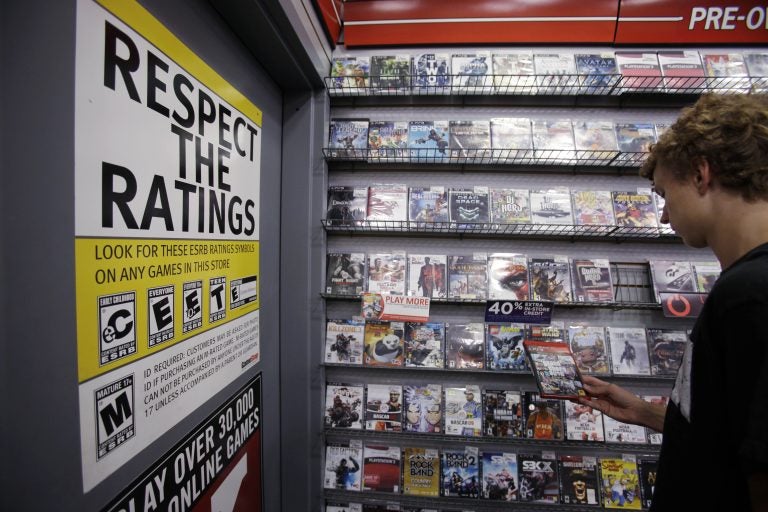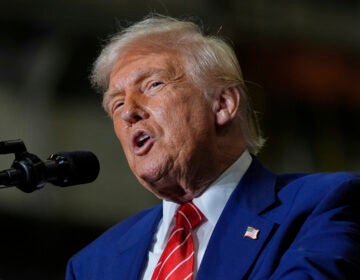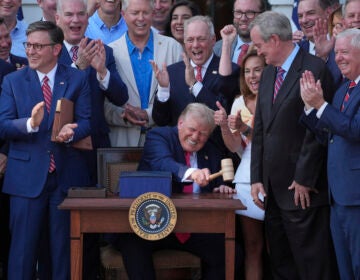Pa. weighs plan to tax violent video games to fund school security
The video game tax would pay for bulletproof glass and metal detectors at schools, but researchers say the proposal is misguided.

Jack Schooner, 16, looks at Grand Theft Auto video game at GameStop in Palo Alto, Calif., Monday, June 27, 2011. The Supreme Court ruled Monday that it is unconstitutional to bar children from buying or renting violent video games, saying government doesn't have the authority to "restrict the ideas to which children may be exposed" despite complaints that the popular and fast-changing technology allows the young to simulate acts of brutality. (Paul Sakuma/AP Photo)
A Pennsylvania lawmaker has proposed a tax on violent video games as a way to pay for increased security at public schools throughout the state.
The bill, introduced with bipartisan support by Rep. Chris Quinn (R- Delaware County), proposes an extra 10 percent sales tax on video games. Quinn said that levy would generate around $3.5 million a year for metal detectors, bulletproof glass and additional security cameras.
Quinn believes video games are a contributing factor to school violence, citing the fact that the U.S. military uses games to train soldiers.
“So how do we ask that industry and people who are consuming that product to help bear some of that societal cost?” he asked.
Research has consistently found no direct connection between playing video games and engaging in real-world violence.
Patrick Markey, a psychology professor at Villanova University and co-author of “Moral Combat: Why the War on Violent Video Games is Wrong,” said some studies have demonstrated a short-term increase in aggression after playing video games. Markey said that change in behavior is fleeting and has not been shown to inspire violent acts.
“The evidence isn’t there for kind of linking video games, or again, any violent media, to these kinds of horrific acts of violence,” Markey said.
One study that examined 10 mass shooters found eight did not play video games regularly.
“Not only is interest in violent video games rare among school shooters, these perpetrators actually express significantly less interest in this violent medium than most of their peers,” Markey writes in his book.
“I couldn’t care less about whether or not we tax video games,” Markey said in an interview. “But I just don’t want people to think that taxing video games will make the world safer because it won’t.”
The video game industry is gearing up to oppose the legislation. Dan Hewitt, a spokesman for the Entertainment Software Association, said the proposed measure violates the right to free speech. If the proposal becomes law, he said, look for a legal challenge.
“Efforts, like Pennsylvania’s, to single out video games based on their content will be struck down,” said Hewitt.
Hewitt cited a 2011 U.S. Supreme Court ruling that video games are protected by the First Amendment. That decision invalidated a California law that banned selling or renting violent video games to minors.
Quinn, who introduced a similar bill that failed to gain momentum last session, said the current version of the legislation may have to be rewritten to address the free speech issue — though he doesn’t expect the threat of a legal challenge to derail his push.
Details on his proposal have spread fast in the gaming community, and his office has been inundated with messages condemning the effort.
“I’m already feeling the pressure,” Quinn said. “Gaming magazines are asking their constituency to start calling, and they’re sending nasty notes to me. I’m feeling the pain.
“But I don’t believe the families who live in my district feel the same way.”
The bill, which has been referred to the finance committee, is co-sponsored by Rep. Ed Neilson (D-Philadelphia) and Rep. Carol Hill-Evans (D-York), who said in a statement she no longer supports the plan.
A comparable measure to tax video games for mental health funding was proposed last year in Rhode Island. A similar effort was introduced and died in Missouri after lobbying from the gaming industry. No state has been able to successfully pass a video game tax.
Markey from Villanova hopes Pennsylvania does not become the first to regulate video games. In the wake of mass shootings, he said, video games often become a scapegoat for more systemic failings.
“Whenever we look for causes of school shootings, it’s easy to look for politicians and lawmakers and the media to point to video games and say, ‘This is what we need to do something about, don’t worry about assault weapons or other things that may be causing acts of violence,’” he said. “And that’s my biggest fear, that it becomes a distraction from what might be actually causing these acts of violence.”
WHYY is your source for fact-based, in-depth journalism and information. As a nonprofit organization, we rely on financial support from readers like you. Please give today.





